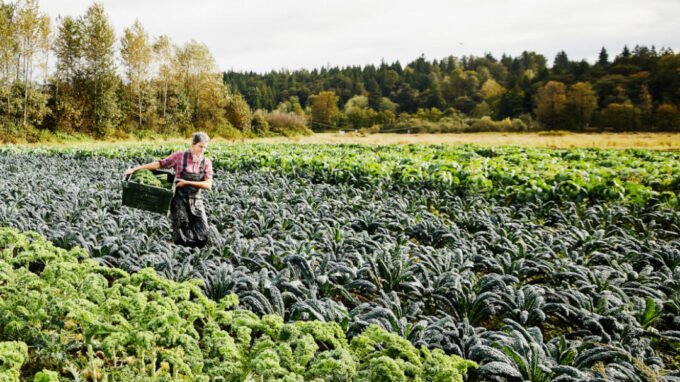In today’s world, agriculture extends far beyond the traditional fields of farming, playing a crucial role in addressing global challenges such as food security, sustainability, and climate change. The sector is rapidly advancing, combining ancient practices with modern technologies and innovative approaches to meet contemporary demands.
For those drawn to making a significant impact in this vital area, higher education in agriculture opens up a wealth of opportunities and pathways to a variety of career options and advancements in sustainable practices.
Higher education in this field provides a foundation for a broad spectrum of career possibilities, equipping students with the knowledge and skills needed to thrive in various agricultural domains.
This education is essential for those looking to contribute to an industry that is key to our planet’s future. With the introduction of online learning platforms, accessing an agriculture degree has become more flexible than ever, allowing students to tailor their education to their personal and professional lives.
1. Wide Range of Career Opportunities

Source: onlineu.com
The agriculture sector offers a wide array of career paths, from the science-based fields of agronomy and biotechnology to areas like agribusiness management and environmental conservation. These careers reflect the sector’s crucial role in tackling the challenges of feeding a growing population, preserving the environment, and promoting sustainable communities.
For those exploring a future in this evolving field, starting with an education is key. Enrolling in an agriculture degree online opens doors to these extensive career opportunities, providing the convenience of studying from any location.
This option is particularly beneficial for aspiring professionals, allowing them to acquire the necessary knowledge and skills while managing other commitments. The demand for skilled graduates in agriculture is growing, driven by the need for new solutions to ongoing and emerging challenges, ensuring a promising future for those entering the field.
2. Contribution to Sustainability and Environmental Protection
Higher education in agriculture is not just about cultivating crops or managing livestock; it’s about nurturing the stewards of our planet. This field of study empowers students with the knowledge and tools to develop and implement sustainable farming practices that minimize environmental impact and promote ecological balance.
As the world grapples with the consequences of climate change, the role of educated agricultural professionals in crafting solutions that protect biodiversity, conserve water, and reduce the use of harmful chemicals has never been more critical.
The curriculum of agricultural studies is designed to instill a deep understanding of the complex interplay between farming practices and environmental health. Students learn to approach agriculture with a conservationist mindset, aiming to produce food in ways that regenerate the earth rather than deplete it.
By prioritizing sustainability, higher education in agriculture prepares graduates to lead the charge in transforming the agriculture sector into a force for environmental protection, ensuring that future generations inherit a healthier planet.
3. Technological Advancements in Agriculture

Source: innovationnewsnetwork.com
Agriculture in the 21st century is a hotbed of technological innovation. From precision farming that optimizes the use of resources to biotechnological advances that enhance crop resilience, technology is reshaping the landscape of agriculture.
Higher education plays a pivotal role in preparing students to not just adapt to these changes but to be at the forefront of creating them. Through a curriculum that integrates science, technology, engineering, and mathematics (STEM) with traditional agricultural practices, students are equipped with the skills needed to innovate and excel in a rapidly evolving field.
The integration of technology into agriculture has opened up new avenues for efficiency, sustainability, and productivity. Drones, satellite imagery, and sensor technology are becoming standard tools for the modern farmer, providing data-driven insights that were once beyond reach.
As agriculture continues to embrace the digital age, the demand for professionals who can navigate the intersection of technology and farming is soaring. Higher education in agriculture is the crucible in which the next generation of agricultural technologists is forged, ready to tackle the challenges of modern farming with innovative solutions.
4. Global Food Security and Supply Chain Management
One of the most pressing issues facing the world today is ensuring food security for a growing global population. Higher education in agriculture addresses this challenge head-on by equipping students with the knowledge and skills to improve food production systems and supply chain management.
Through specialized courses in agricultural economics, students learn how to increase efficiency in food distribution, reduce waste, and ensure that nutritious food reaches those in need, regardless of geographic constraints.
Understanding the intricacies of the global food market and the policies that influence it is crucial for developing strategies that can withstand the complexities of international trade and changing climate conditions.
Graduates with a background in agriculture are uniquely positioned to innovate within the food supply chain, making significant contributions to global food security and paving the way for a future where hunger is a problem of the past.
5. Entrepreneurial Opportunities and Economic Development

Source: wbcsd.org
Agriculture is not just a field of study; it’s a launchpad for entrepreneurs looking to make a difference. Higher education in agriculture fosters a spirit of innovation and entrepreneurship, encouraging students to apply their knowledge in creating sustainable business models.
From tech-driven startups aiming to revolutionize farming practices to social enterprises focused on community agriculture, the opportunities for entrepreneurial ventures in this sector are vast and varied.
Moreover, agriculture plays a pivotal role in the economic development of rural areas, where it often serves as the primary source of livelihood. Educated agricultural professionals can drive advancements that boost local economies, create jobs, and improve living standards.
By harnessing the power of agriculture for economic development, graduates can contribute to building resilient communities that are capable of sustaining themselves and thriving economically.
6. Personal Fulfillment and Connection to Nature
For many, the pursuit of higher education in agriculture is driven by a deep-seated connection to the land and a desire to contribute positively to the world. This field offers a unique blend of scientific inquiry and hands-on work, allowing individuals to engage directly with nature. There’s a profound sense of fulfillment that comes from knowing your efforts help feed people, protect the environment, and create a sustainable future.
The agricultural sector’s shift towards organic, local, and artisanal food production reflects a broader societal movement towards health and sustainability. For those passionate about these issues, a career in agriculture offers a way to live one’s values while making a tangible impact. The personal satisfaction derived from this alignment of professional and personal values is unmatched, making agriculture a deeply rewarding field of study and work.
Conclusion

Source: afbic.com
The decision to pursue higher education in agriculture is a commitment to playing a vital role in solving some of the world’s most critical challenges. From addressing global food security and enhancing sustainability to driving technological innovation and fostering economic development, the opportunities in this field are as broad as they are impactful.
Moreover, the personal fulfillment that comes from a career connected to nature and aligned with the values of environmental stewardship and community well-being adds a layer of satisfaction that transcends traditional career metrics.







